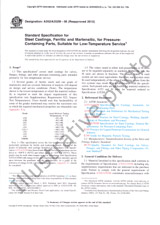We need your consent to use the individual data so that you can see information about your interests, among other things. Click "OK" to give your consent.
ASTM D1708-18
Standard Test Method for Tensile Properties of Plastics by Use of Microtensile Specimens
Translate name
STANDARD published on 1.10.2018
The information about the standard:
Designation standards: ASTM D1708-18
Publication date standards: 1.10.2018
SKU: NS-899555
The number of pages: 5
Approximate weight : 15 g (0.03 lbs)
Country: American technical standard
Category: Technical standards ASTM
The category - similar standards:
Annotation of standard text ASTM D1708-18 :
Keywords:
microtensile, plastics test method, tensile properties,, ICS Number Code 83.080.01 (Plastics in general)
Additional information
| Significance and Use | ||||||||||||||||
|
4.1 This test method provides data for quality control and acceptance or rejection under specifications. 4.2 Before proceeding with this test method, reference the ASTM specification of the material being tested. Any test specimen preparation, conditioning, dimensions, or testing parameters, or combination thereof, covered in the materials specification takes precedence over those mentioned in this test method. If there are no material specifications, then the default conditions herein apply. Table 1 of Classification System D4000 lists the ASTM materials standards that currently exist. |
||||||||||||||||
| 1. Scope | ||||||||||||||||
|
1.1 This test method covers certain material specifications for which a history of data has been obtained using the standard microtensile specimen. In general, this test method is superseded for general use by either Test Method D882 or Test Method D638. The very small Type V specimen in Test Method D638 is the recommended specimen when limited amounts of material are available. 1.2 This test method covers the determination of the comparative tensile strength and elongation properties of plastics in the form of standard microtensile test specimens when tested under defined conditions of pretreatment, temperature, humidity, and testing machine speed. This method is applicable when using specimens of any thickness up to 3.2 mm (1/8 in.), including thin films. 1.3 This test method cannot be used for the determination of modulus of elasticity. For the determination of modulus, see Test Method D638 or Test Methods D882. 1.4 Data obtained by this test method are relevant and appropriate for use in engineering design. Note 1: Tensile properties provide useful data for plastics
engineering design purposes. However, because of the high degree of
sensitivity exhibited by many plastics to rate of straining and
environmental conditions, data obtained by this test method cannot
be considered valid for applications involving load-time scales or
environments widely different from those of this test method. In
cases of such dissimilarity, no reliable estimation of the limit of
usefulness can be made for most plastics. This sensitivity to rate
of straining and environment necessitates testing over a broad
load-time scale (including impact and creep) and range of
environmental conditions if tensile properties are to suffice for
engineering design purposes.
1.5 The values stated in SI units are to be regarded as standard. The values given in parentheses are for information only. 1.6 This standard does not purport to address all of the safety concerns, if any, associated with its use. It is the responsibility of the user of this standard to establish appropriate safety, health, and environmental practices and determine the applicability of regulatory limitations prior to use. Note 2: There is no known ISO equivalent to this
standard.
1.7 This international standard was developed in accordance with internationally recognized principles on standardization established in the Decision on Principles for the Development of International Standards, Guides and Recommendations issued by the World Trade Organization Technical Barriers to Trade (TBT) Committee. |
||||||||||||||||
| 2. Referenced Documents | ||||||||||||||||
|
We recommend:
Updating of laws
Do you want to be sure about the validity of used regulations?
We offer you a solution so that you could use valid and updated legislative regulations.
Would you like to get more information? Look at this page.




 Cookies
Cookies
